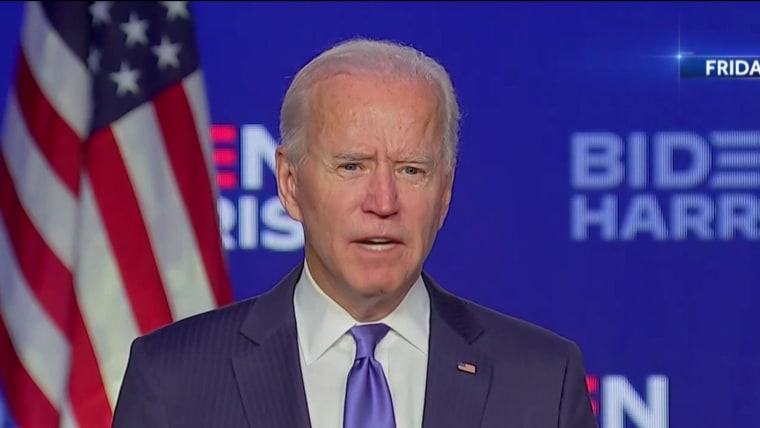When Joe Biden clinched the presidency on Saturday, climate activists breathed a sigh of relief.
After four years of President Donald Trump denying the science of climate change anddismantling or rolling back more than 100 existing environmental protections, climate experts knew the stakes in this election could not have been higher.
“The climate movement was very clear-eyed about just how crucial this election was, so I think that made anxiety run pretty darn high,” said Katharine Wilkinson, editor-in-chief of Project Drawdown, a coalition of researchers and scientists who are working on climate change solutions. “Science tells us we don’t have time for another four years of a Trump administration. We don’t have time for four more years of bailing out failing fossil fuel companies and four more years of moving backwards.”
Wilkinson, who is also a co-founder of the All We Can Save project, a women-led climate nonprofit, said the past few days have been “definitely a roller coaster.” Now, experts say they are eager for the new president to get to work on tackling the climate crisis.
But if Republicans keep control of the Senate, there may be challenges ahead as Biden tries to turn his plans into action. Most climate activists have applauded Biden’s climate plan, which includes investing $2 trillion over four years and aims to achieve a 100 percent clean electricity standard by 2035.
Democrats gained one new Senate seat, but need to pick up two more to reach 50 and assume control, with Vice President-elect Kamala Harris as the tie-breaking vote. Two Senate seats in Georgia, now held by Republicans, will be decided in a runoff election on Jan. 5, which means the makeup of the Senate hangs in the balance until then.
Still, Biden can make progress on climate issues even if the Senate majority remains in Republican hands, according to Shiv Someshwar, a visiting professor at Columbia University’s School of International and Public Affairs.
It’s unlikely that sweeping legislation along the lines of the Green New Deal could move forward without a Democrat-controlled Senate, but a Biden administration can still address some short- and long-term impacts of climate change, he said.
“While massive investments may not be possible, the Biden administration could be active in rolling out regulations that are designed to limit [greenhouse gas] emission and those that minimize climate risk in future on public and private assets,” said Someshwar, who also serves as European chair for sustainable development and climate transition at the Paris Institute of Political Studies in France.
This could include supporting the national adoption of fuel efficiency standards for cars and trucks such as those that have been introduced by California Gov. Gavin Newsom, Someshwar added.
Gina McCarthy, president and CEO of the Natural Resources Defense Council, said that if the public demands action on climate, sluggish lawmakers may be forced to take note.
“Even if the U.S. Senate doesn’t lead on strong climate policy, they can be dragged along and we can expect to see progress regardless of who is controlling the Senate,” she said Thursday, two days after the election, at a news conference with several prominent environmental organizations.
McCarthy, who served as administrator of the Environmental Protection Agency under the Obama administration, added that fighting climate change “isn’t just about protecting polar bears in faraway places — it’s essentially about protecting people, our families, right here and right now.”
Climate experts are also keen for Biden to repair the United States’ reputation internationally. The day after the election, the U.S. formally exited the Paris Agreement, a global pact among more than 185 nations to curb emissions and keep rising average temperatures below 3.6 degrees Fahrenheit, or 2 degrees Celsius. Trump announced his intention to withdraw from the landmark climate accord in 2017, and the process was initiated a year ago.
Biden has said that he intends to rejoin the Paris Agreement, but the U.S. has a lot of ground to make up to meet the goals of the accord. And it’s becoming increasingly clear that deeper cuts to emissions will be necessary to limit global warming to below 3.6 degrees F, according to Michael Mann, a climatologist and professor of atmospheric science at Penn State University.
“The sobering reality is that even if every country meets their commitment under Paris (and many, including the U.S. and E.U. are currently falling short), that gets us less than halfway to where we need to be,” he told NBC News in an email. “Paris is a good starting point, but we need to go well beyond Paris now to achieve the reductions that are necessary.”
Mann acknowledged, however, that Biden’s presidential victory favors “an atmosphere of global cooperation.”
And while plenty of challenges lie ahead, Wilkinson said it was heartening to see climate politics play such an important role this election cycle.
NBC News exit polls of early and Election Day voters indicated that two-thirds of voters said they believe that climate change is a serious problem. Those same polls showed that Biden won about 7 in 10 voters who see climate change as a serious problem.
“There are lots of climate silver linings in this election,” she said. “Of course the big question mark is what the makeup of the Senate looks like, and will we have the full suite of levers for bold climate action in 2021, but I’m cautiously hopeful.”
"now" - Google News
November 10, 2020 at 01:54AM
https://ift.tt/35aP0IV
Environmentalists say Biden's win was 'crucial' for climate progress. Now what? - NBC News
"now" - Google News
https://ift.tt/35sfxPY
Bagikan Berita Ini
















0 Response to "Environmentalists say Biden's win was 'crucial' for climate progress. Now what? - NBC News"
Post a Comment